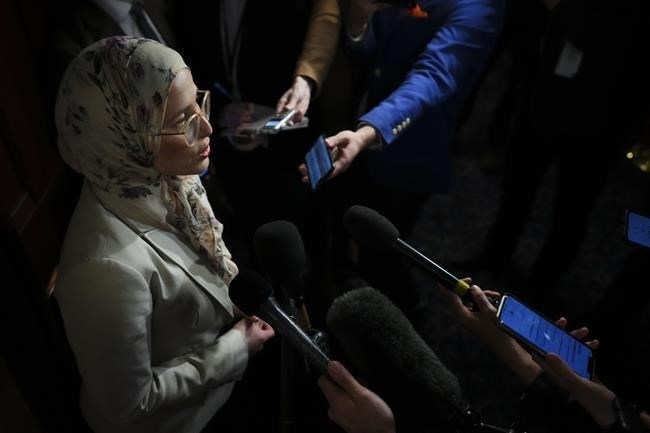
Amira Elghawaby speaks with reporters on Parliament Hill in Ottawa on Wednesday, Feb. 1, 2023. Elghawaby, Canada's special representative on combating Islamophobia, says a chill on freedom of speech is deepening the pain Muslims in Canada are already feeling over the ongoing tragedy in the Gaza Strip.
Image Credit: THE CANADIAN PRESS/Sean Kilpatrick
January 27, 2024 - 2:30 PM
OTTAWA - A chill on freedom of speech is deepening the pain Muslims in Canada are already feeling over the ongoing tragedy in the Gaza Strip, says Canada's special representative on combating Islamophobia.
"There is a lot of silencing," Amira Elghawaby said in an interview with The Canadian Press.
"Many members of Canada's Muslim, Arab and Palestinian communities right now do not feel fully safe to share their views on what's happening in Gaza."
Annual data are still being compiled, but police across Canada have been reporting marked increases in the number of crimes targeting Muslims and Jews alike since the conflict erupted in October.
That, Elghawaby said, has added an additional layer of trauma to the ongoing horrors in the Middle East that have killed the relatives of many Canadians.
Appointed a year ago, Elghawaby monitors the issues and policies that impact the lives of Muslims in Canada and counsels governments on how best to prevent anti-Muslim hate.
The tenor of her work changed dramatically after Oct. 7.
That's when Hamas militants staged a vicious and brazen attack on civilians in Israel, which retaliated with a fearsome bombing campaign in the Gaza Strip. Heated protests across Canada ensued.
In Ottawa, a mosque was smeared with feces. Near Vancouver, a rabbi's house was egged and vandalized with a swastika. Students clashed in Montreal. Protests in Toronto were marred by death threats.
Foreign Affairs Minister Mélanie Joly said she’d never seen an international issue cause so much strife in Canada.
"The tensions and the violence and the antisemitism in Montreal, in Toronto, that you’re seeing is heart-wrenching," Joly said earlier this week.
"We need to be able to trust one another, because we have to be able to live in a country where we don’t fear our neighbour."
The federal Liberal government has offered more money for things like security cameras and guards at places of worship. Their Conservative rivals call it too little, too late.
Better government co-ordination would allow more precise measures, Elghawaby argues, weeding out criminal acts of hate targeting any community while preserving their right to speak out.
She's been partnering with Deborah Lyons — formerly Canada's ambassador to Israel, now a special envoy for battling antisemitism — on developing a multi-sector approach.
"People have a right to speak about their views on issues without fear of retribution," Elghawaby said.
"At the same time, people have a right to feel safe, and that if speech crosses into hateful rhetoric, that there are consequences."
Officials in Lyons' office declined a request to speak to her about her work.
Of the many protests to date backing a ceasefire in Gaza, only a few have broken the peace, and yet those taking part are often accused of supporting terrorism, Elghawaby said.
"On any topic, there will always be a potential that a line will be crossed. And if that happens, individuals will have to face those consequences," she said.
"But it's wholly unfair to describe protests all as, for example, hate-fests, or assume support for a particular ideology."
As a result, Muslims and others with Palestinian roots face hostility when they raise concerns about Israel's campaign in Gaza, which has killed thousands.
The University of Ottawa suspended a resident physician over pro-Palestinian social media posts that a colleague argued were antisemitic; the physician was ultimately reinstated. A similar case occurred for a nephrologist at a hospital in Richmond Hill, Ont.
Hundreds of law students, lawyers and professors from across Canada have signed a petition decrying a "pervasive repression of speech" where those expressing solidarity with Palestinians or criticizing Israel are being reported to their bosses for alleged antisemitism.
The United Nations human rights office warned last November of a "worldwide wave of attacks, reprisals, criminalization and sanctions" against victims of the conflict. Artists, academics and athletes have been blacklisted for showing solidarity with Palestinians, it noted.
"There is this real trauma in our communities about the horrific loss of lives that we've been seeing," Elghawaby said.
"A very distressing layer to that trauma is the fact that we are seeing increasing Islamophobia and antisemitism that is affecting people's sense of belonging, people's sense of safety."
Not to mention their ability to speak out publicly.
And the widening cultural divide is only making matters worse, especially where social media is concerned, said Carmen Celestini, a religion and social theory lecturer at the University of Waterloo.
“You already feel concerned about what you're going to say," said Celestini, who studies how religion, extremism, conspiracy theories and politics intersect.
"But it can also push this narrative of, 'Well, we can't talk about X because we'll get cancelled,' or, 'Someone will see us as a racist or an antisemite.' And people are being silent in some ways because of that."
This report by The Canadian Press was first published Jan. 27, 2024.
News from © The Canadian Press, 2024